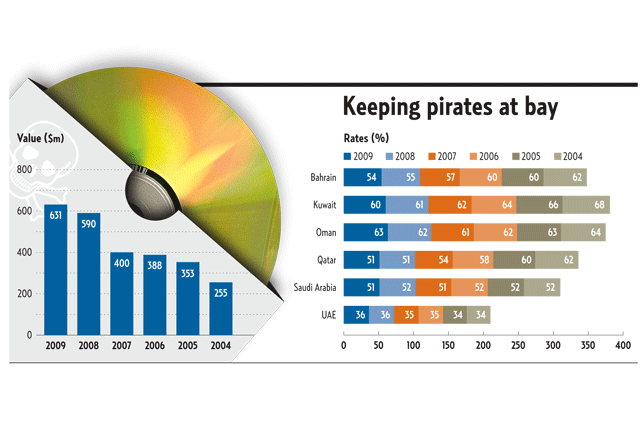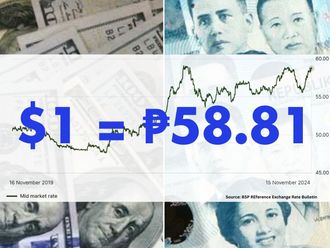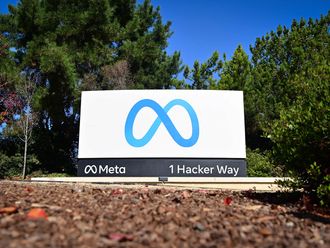
Dubai: Software piracy losses in the Gulf states stood at $631 million (Dh2,317 million) in 2009, an increase of 6.95 per cent compared to losses of $590 million incurred in 2008 as the recession led to changes in consumer behaviour that kept illegal copying in check, a study on global piracy trends shows.
According to the seventh annual BSA-IDC global software piracy study, the UAE is the only Arab country ranked among the lowest-piracy countries in the world.
The country is ranked at 21st, the same as in 2008. The UAE's anti-piracy rating remained the same as in 2008 at 36 per cent.
Globally, losses from software piracy broke the $50 billion level for the first time in 2008. In 2009, the value of unlicensed software hit $51.4 billion, a three per cent decrease from 2008. However, in real terms and factoring in adjustments for exchange rates, the value of unlicensed software stayed the same in 2009 as 2008.
Economy
Illegally-copied programs represented 43 per cent of all software sales, two percentage points more than in 2008 largely as a result of PC sales and software installations growing much faster in emerging economies than in more mature markets with lower piracy rates, the study said.
Economies with the lowest software piracy rates remain the United States, with a piracy rate of 20 per cent, and Japan and Luxembourg, both with a piracy rate of 21 per cent. Economies with the highest piracy rates include Georgia, Bangladesh, Zimbabwe and Moldova, each with a rate above 90 per cent.
The study shows that out of the six Gulf countries, Qatar and the UAE were the two countries to register the same rates as in 2008 while Bahrain, Kuwait and Saudi Arabia recorded a one percentage points fall in 2009. Oman was the sole country to register a one percentage point rise to 63 per cent.
Qatar's losses jumped by 92.30 per cent in 2009 to $50 million, followed by Oman's rise by 50 per cent to $39 million and Saudi Arabia's 11.76 per cent rise to $304 million. Bahrain's losses decreased by 22.22 per cent to $21 million, followed by Kuwait's 10.15 per cent to $62 and the UAE's 8.82 per cent fall to $155 million.
Saudi Arabia was ranked 29th globally in the highest commercial value of pirated software in 2009.
"In most Gulf countries, software piracy over the last few years has only varied by around two to three per cent, however the financial losses that this represents can be more than $100 million in some countries. That means one third of all software in the UAE is pirated, a figure that affects all software vendors who operate in the region and Adobe is no exception. The effects of these losses are felt across the industry, by all software vendors, as well as by the economy in the form of GDP contribution and new job opportunities," Nasser Samaenah, Regional Licence Compliance Manager, Adobe, Middle East and North Africa, told Gulf News in an interview.
Risks
"The UAE is leading the way in the Gulf when it comes to setting and enforcing rules and regulations that protect intellectual properties, and hence it has the lowest percentage piracy rate in the region, according to IDC research. Software companies, the BSA and the UAE Government together will continue educating businesses and individuals on the risks of using pirated software, the potential penalties and the implications for the national economy, GDP and employment opportunities within the country. The UAE Ministry of Economy, Dubai Customs, Dubai Police and technology companies — including Adobe, are all playing critical roles in ensuring that the UAE leads the way in enforcing and protecting intellectual property rights," he said.
The report said that global piracy has increased largely because of the unprecedented growth of the IT industry in areas where there are no committed efforts to control piracy. The spread of the internet has likewise contributed to the current situation as access to pirated software has moved from the streets to the internet,
"We believe that education and enforcement together will have a positive future impact on reducing the level of piracy in the UAE, and we hope to begin to see these results in the coming years," he said.
Still, it's estimated that, for every $100 of software sold, an additional $75 worth of unauthorised versions enter the market. A typical scenario is a business buying a single legitimate copy and then installing it on dozens of computers to avoid paying licensing costs.












